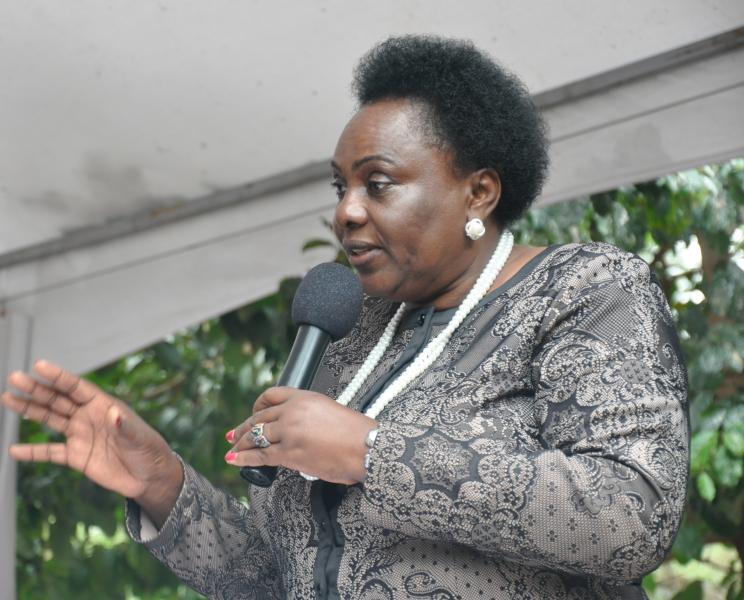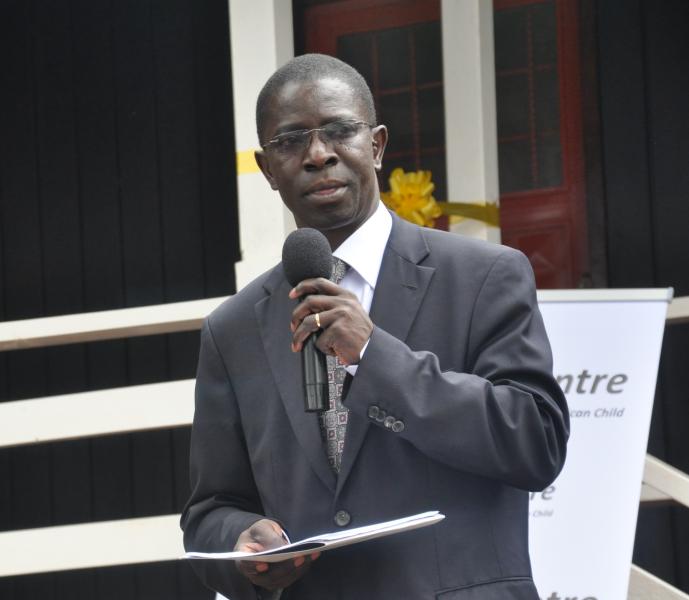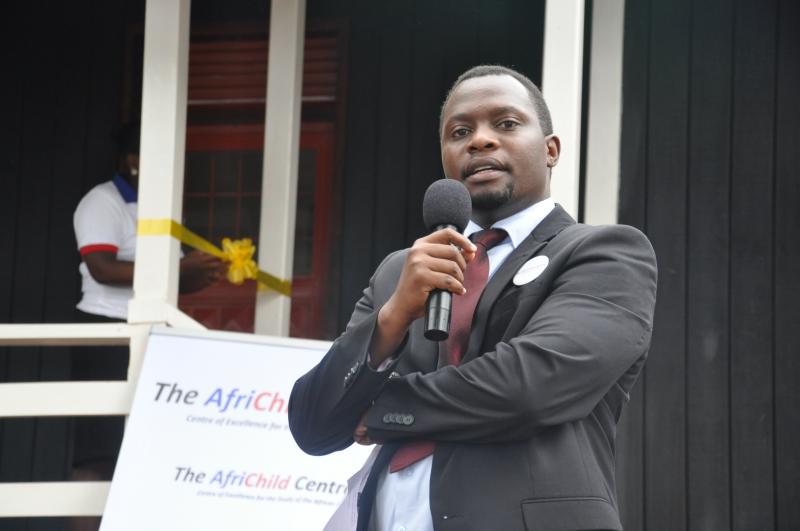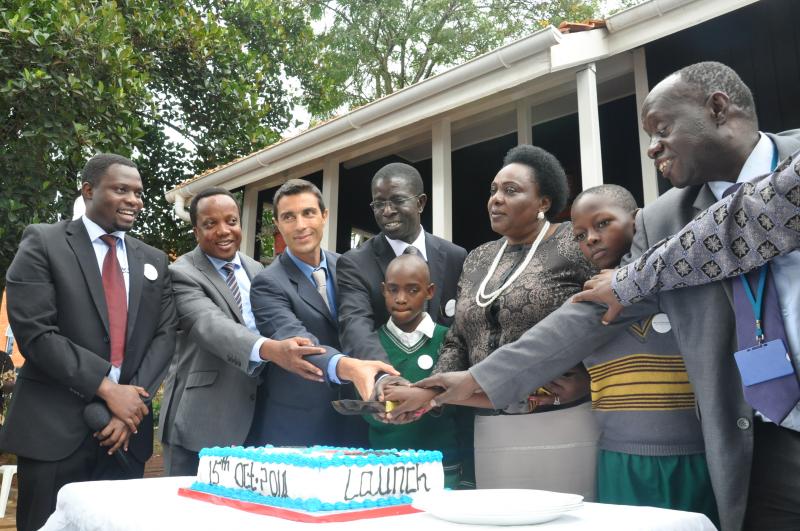
Although the government has undertaken a number of initiatives and programmes to improve the lives of children in Uganda, a lot more has to be done to ensure they grow up free from violence and with equal opportunities to develop their full potential. Speaking the launch of the Centre of Excellence for the Study of the African Child (AfriChild Centre) today, 15th October, 2014, the Minister of Gender, Labour and Social Dev
Gender, Labour and Social Dev elopment, Hon. Mary Karooro Okurut, said there is need for more evidence-based data on the situation of children in Uganda. According to UNICEF Uganda statistics, 2009, children comprise of about 56% of Uganda’s population. By 2010, Uganda had a population of 33 million people, including about 19 million children. However, the living conditions for this important group of Ugandan society are still wanting. Children continue to live in conditions characterized by inadequate access to health services, biting poverty in homes, exploitation and violence. The living conditions for children in Uganda undermine the four cardinal rights which include the rights to; Survival, Development, Protection and Participation.
elopment, Hon. Mary Karooro Okurut, said there is need for more evidence-based data on the situation of children in Uganda. According to UNICEF Uganda statistics, 2009, children comprise of about 56% of Uganda’s population. By 2010, Uganda had a population of 33 million people, including about 19 million children. However, the living conditions for this important group of Ugandan society are still wanting. Children continue to live in conditions characterized by inadequate access to health services, biting poverty in homes, exploitation and violence. The living conditions for children in Uganda undermine the four cardinal rights which include the rights to; Survival, Development, Protection and Participation.
Hon. Okurut underscored the need for high-quality and specialized training for effective management of programmes that support children and their families. She noted that many people in the social welfare workforce in Uganda lack specialised training in child protection and therefore lack adequate skills to perform their duties. She commended the founders of the AfriChild Centre for the initiative aimed at addressing the gaps in child protection and pledged continued government support towards the activities of the Centre.
In his keynote address, the Principal of CHUSS, Prof. Edward K. Kirumira, highlighted the absence of adequate, systematic and coordinated data aimed at informing policy, programming and practise as one of the key challenges to promoting child welfare in Uganda. “While symptoms of the plight of children are visible, the actual magnitude of the problem is unknown. Although studies have been done on violence against children in Uganda, there’s no substantive national data on the prevalence of violence against children in the country. In situations where data exists, it’s either selectively representative or was gathered with limited scientific rigour, making it easily dismissible. By implication, many of the programs and interventions geared towards children are minimally evidence driven,” he explained.
in Uganda, there’s no substantive national data on the prevalence of violence against children in the country. In situations where data exists, it’s either selectively representative or was gathered with limited scientific rigour, making it easily dismissible. By implication, many of the programs and interventions geared towards children are minimally evidence driven,” he explained.
Prof. Kirumira emphasized the need for an effective, highly skilled and knowledgeable critical mass of human resource to improve service delivery in the social protection sector. He noted that the AfriChild Centre will go a long way in bridging gaps in research, knowledge and practice in the area of child protection in Uganda, the East African Region and across the continent. “The AfriChild Centre is not just another research institute or NGO. It has been formed to convene diverse groups and form strong partnerships from the start that ensure we work together effectively to generate high-quality scientific research and knowledge on children that is then used by decision makers to improve policy and practice impacting children,” he said.
Prof. Kirumira expressed gratitude to Makerere University Management for allocating space to the project. The Centre is housed in New House opposite Lumumba Hall.
The Commissioner of Children and Youth Affairs in the Ministry of Gender, Labour and Social Development, Mr Francis Mondo Kyateka, said investment in children is the most prudent strategy that contributes to the development of human resource.
The AfriChild Centre works to improve child protection practice and inform policy through a systematic process of convening scientific research, analysis and knowledge development. Through a multi-disciplinary and multi-institutional approach, the Centre seeks to deepen the quality of evaluative research and effectiveness measurement of child wellbeing interventions, in line with the global discourse and action on child rights and protection. The AfriChild Centre is uniquely positioned to address, from a multi-institutional dimension, significant conceptual, methodological, cultural, and logistical gaps in the  translation of research to policy and practice in the child protection and care community. Given its positioning in Uganda, and access to a wide range of southern networks alongside northern ones, the Centre provides a huge opportunity to facilitate the transfer of research outputs and effective practices across institutions, regions and sectors.
translation of research to policy and practice in the child protection and care community. Given its positioning in Uganda, and access to a wide range of southern networks alongside northern ones, the Centre provides a huge opportunity to facilitate the transfer of research outputs and effective practices across institutions, regions and sectors.
The AfriChild Centre is a product of academia, government, civil society and international development agencies i.e. Uganda Program Learning Group of the Child Protection in Crisis (CPC) Network promoted by six partners namely: Ministry of Gender, Labour and Social Development; UNICEF-Uganda; ChildFund International Uganda Office; Makerere University College of Humanities and Social Sciences (CHUSS); TPO Uganda; and Columbia University. The Centre has an advisory board of seven people and is chaired by Prof. Kirumira.
To achieve its mission, the AfriChild Centre focuses on five key areas of engagement that include research, capacity building, advocacy, partnerships and technical backstopping.
According to the Assistant Commissioner of Children Affairs in the Ministry of Gender, Labour and Social Development, Mr James Kaboggoza, the Centre strongly emphasizes capacity building for individuals and groups who develop and deliver services to children. The Centre is creating and supporting professional development opportunities for government and NGO staff to improve their ability to conduct and interpret their research findings. “Young researchers will have opportunities to actively build their skills in undertaking research on children that is linked to action as they participate as interviewers in the Uganda National Child Well-being Survey that will be implemented between January and April, 2015,” he said.
In partnership with UNICEF Uganda, the AfriChild Centre is assisting the Ministry of Gender, Labour and Social Development in facilitating the development of a Uganda National Child Protection Strategy that will articulate a vision for children in Uganda and establish linkages across sectors of action to set priorities for preventing and responding to abuse and neglect of children in the country.
